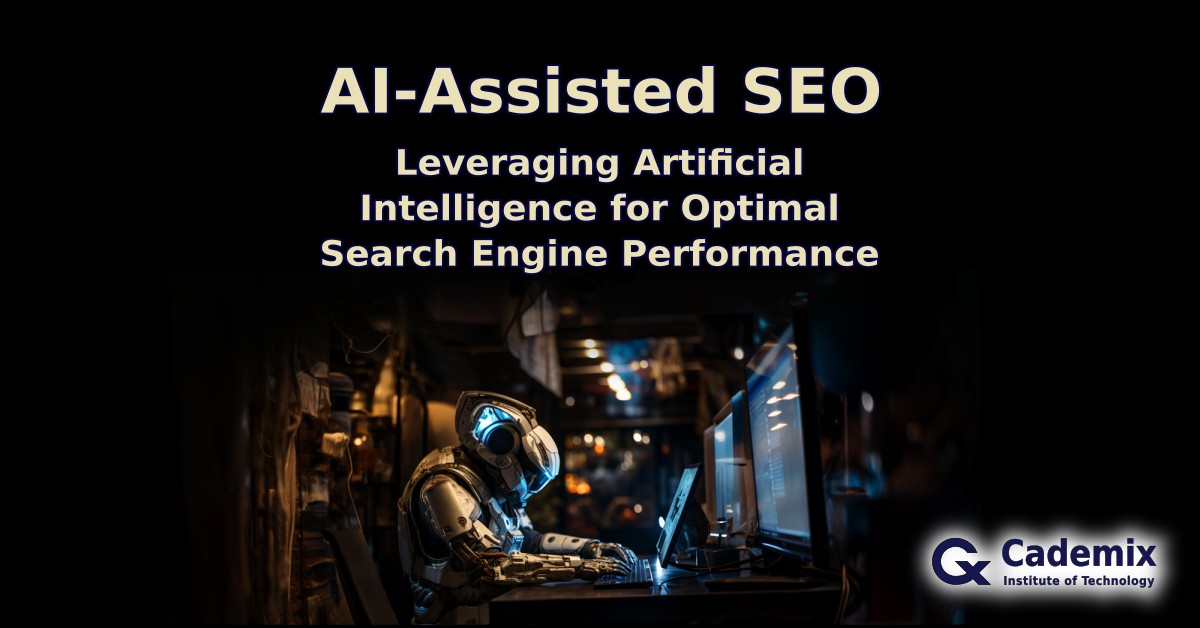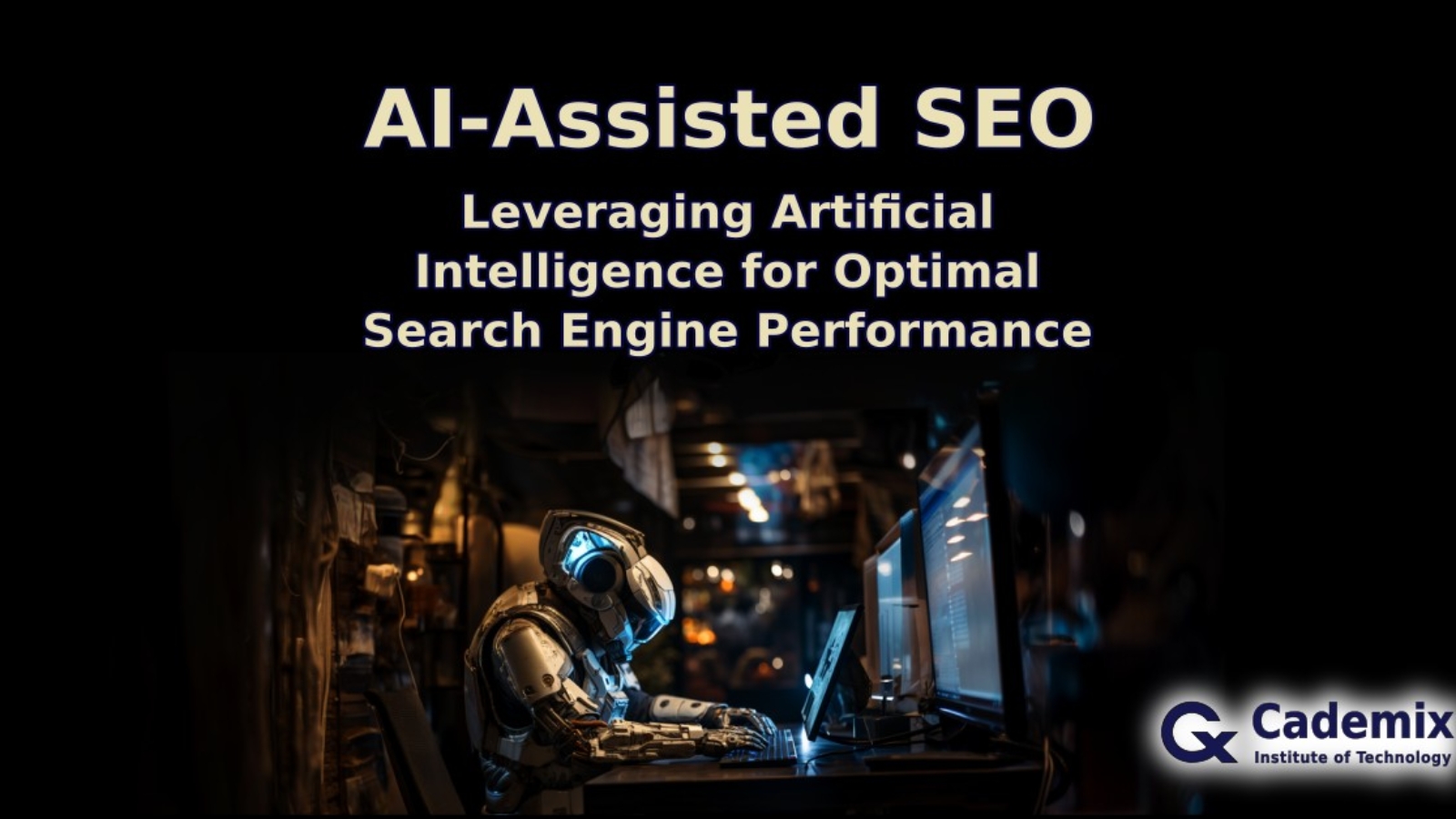This article serves as a comprehensive review, guide, and consultation resource on the increasing role of artificial intelligence (AI) in search engine optimization (SEO). Aimed at a broad audience, it explores the applications, challenges, and strategies for integrating AI in SEO practices. In addition to providing a research-based overview, the article offers actionable insights for leveraging AI to optimize search engine performance effectively.
Mahdi Amin-Akhlaghi, Cademix Institute of Technology

Introduction
The digital landscape is an ever-changing environment, continuously shaped and reshaped by technological innovations. Two of the most impactful technologies changing the field are Artificial Intelligence (AI) and Search Engine Optimization (SEO). While AI brings the prowess of machine learning, predictive analytics, and natural language processing, SEO focuses on maximizing the visibility of websites and driving quality traffic through organic search engine results.
The synergy between AI and SEO is not only promising but transformative. As we move into an era where data analytics and machine learning algorithms increasingly influence consumer behavior and business strategy, understanding the intersection of AI and SEO becomes not just beneficial but essential.
Objectives of the Article
This article aims to serve as a comprehensive resource for professionals, researchers, and general readers interested in the future of digital marketing. It provides a detailed review of how AI impacts SEO, offers consultative insights for leveraging AI in SEO strategy, and presents an overview of the challenges and ethical considerations involved. By the end of this article, you will have a robust understanding of the practical applications of AI in SEO, backed by case studies and actionable insights.
The Convergence of AI and SEO
Artificial Intelligence and Search Engine Optimization are both complex fields that have evolved rapidly over the years. However, it is only recently that these two domains have started to intersect in meaningful ways.
AI Technologies That Impact SEO
Machine learning, natural language processing, and predictive analytics are some of the key AI technologies that are being employed to enhance SEO strategies. These technologies allow search engines to understand user intent better, offer personalized experiences, and ensure that the most relevant content is presented to the user.
Algorithm Updates and AI
Search engines frequently update their algorithms to improve user experience. The role of AI in these updates has been growing, making it imperative for SEO professionals to understand the nuances of AI algorithms. These updates influence ranking factors, keyword relevance, and content quality, among other elements critical to SEO.
AI-Driven SEO Tools
Several tools harness the power of AI to provide insights, automate tasks, and offer recommendations for SEO strategies. From keyword research to competitor analysis, AI-powered tools are making SEO more efficient and effective.
Practical Applications
In this section, we will discuss real-world case studies that illustrate the benefits of leveraging AI in SEO strategies. We will look at how businesses from different industries have successfully implemented AI technologies to improve their search engine rankings and user engagement.
Challenges and Ethical Considerations
While the fusion of AI and SEO offers myriad possibilities for enhancing user experience and improving website rankings, it also presents a set of challenges and ethical considerations that must be taken into account.
Data Privacy and Security
AI algorithms require large amounts of data to function effectively. This often involves collecting user information, raising concerns about data privacy and security. It’s crucial for SEO professionals to balance the need for data with the ethical responsibility to protect user information.
Transparency and Accountability
The decision-making processes of AI systems are often opaque, which can make it challenging to ascertain why specific SEO strategies succeed or fail. This lack of transparency could potentially create issues of accountability, especially if a strategy negatively impacts a company’s ranking or reputation.
Algorithmic Bias
AI systems learn from existing data, which can perpetuate existing biases if not carefully managed. In the context of SEO, this could result in unfair ranking or representation of certain topics, industries, or demographics.
Ethical SEO Practices
The drive to optimize a website’s performance can sometimes lead to the employment of ‘black-hat’ SEO tactics that violate search engine guidelines. With AI automating many SEO tasks, there’s a heightened need to ensure that these technologies are programmed to adhere to ethical SEO practices.
Cost and Accessibility
AI technologies, while increasingly affordable, still represent a significant investment. Smaller businesses may find it challenging to access the full range of AI-driven SEO tools, potentially creating a divide between large and small enterprises in search engine rankings.
Future Implications and Ongoing Developments
As the integration of artificial intelligence into SEO practices becomes increasingly prevalent, several key trends and ongoing developments warrant attention from both researchers and practitioners.
Adaptive SEO Strategies
AI enables real-time analysis and adaptability in SEO strategies. This adaptability means SEO will be increasingly dynamic, allowing for strategies to evolve alongside changes in user behavior and search engine algorithms.
Voice Search and Natural Language Processing
Voice search is on the rise, thanks in part to AI advancements in Natural Language Processing (NLP). This has considerable implications for keyword strategy, as conversational queries become more common.
User Experience (UX) and User Interface (UI) Optimization
As AI becomes more sophisticated, its role in enhancing user experience and user interfaces will grow. Expect SEO to become more intrinsically linked with elements of UX and UI design.
Quantum Computing and SEO
While still in the early stages, the potential impact of quantum computing on SEO cannot be ignored. This new computing paradigm could revolutionize data analysis, potentially creating new SEO techniques we have yet to imagine.
Sustainability and Ethical Algorithms
As society places greater emphasis on sustainability and ethical considerations, these factors will likely play a more significant role in SEO algorithms. This could mean a future where ‘green’ or ethically responsible businesses enjoy higher rankings.
Practical Applications and State of the Art
In the evolving landscape of digital marketing, practical applications of AI in SEO have become prominent benchmarks in the industry. Companies like Amazon and media outlets like The New York Times represent the state of the art, employing machine learning and predictive analytics to not just understand user intent but also to effectively improve their rankings.
Strategies for Effective Implementation
- Prioritize Data Quality: Clean, relevant, and unbiased data are the bedrock upon which effective AI algorithms stand.
- Regular Algorithm Training: A commitment to continuous learning improves the efficiency and accuracy of AI-driven SEO tasks.
- Emphasize a User-Centric Approach: While rankings are important, the end goal should be an enhanced user experience.
Actionable Insights for SEO Leveraging AI
- Keyword Optimization: Utilize AI tools like Clearscope or MarketMuse for robust keyword research.
- Real-time Analytics: Platforms like BrightEdge or MozPro offer real-time analytics driven by AI.
- Semantic Search: As conversational queries become more common, tailor your SEO for semantic search.
- User Behavior Analysis: Employ AI to understand how users interact with your site and what they are looking for.
- Content Personalization: Use machine learning to provide a personalized user experience.
- Page Speed Optimization: AI can automate the task of compressing images and improving server response times.
- Voice Search: Be prepared for the surge in voice queries and optimize your SEO strategies accordingly.
- Backlink Analysis: AI can help identify valuable backlink opportunities and assess the quality of current links.
- Mobile Optimization: Use AI to ensure that your site is fully optimized for mobile users.
- Social Media Integration: Leverage AI tools that analyze social media trends and incorporate them into your SEO strategy.
As technology continues to evolve, future trends in voice and semantic search, as well as developments in machine learning, are setting the stage for transformative changes in SEO practices. These shifts don’t just signal a need for adaptability; they offer an opportunity to redefine digital marketing strategies. So don’t wait—integrate AI into your SEO strategies today to navigate the ever-changing digital landscape of tomorrow more efficiently.

